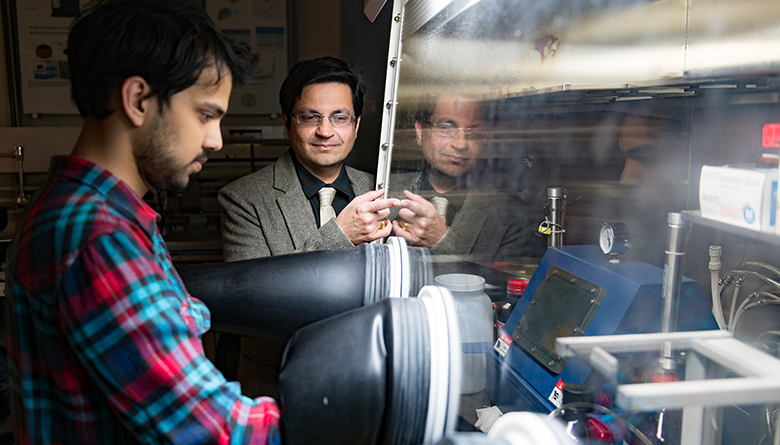By Torie Wells
Solar power installations in the United States have grown significantly since 2008, so much so — the Department of Energy says — that the nation’s solar energy capacity could power the equivalent of 12 million average American homes.
Capturing and storing energy from the sun would not be possible without consistent strides in battery research — an area of study that’s also essential for the development of future electric vehicles and portable electronics like cell phones and laptops.
Batteries touch countless corners of our lives, and are vital in bringing power to countless corners of the world. Nikhil Koratkar, an endowed professor of mechanical, aerospace, and nuclear engineering, is acutely aware of this, and is devoting his career to developing batteries of the future. His extensive research into nanotechnology and energy storage has placed him among the most highly cited researchers in the world.
“In order to create safe, efficient, and affordable batteries, we must either develop new materials to build batteries out of, or improve the materials that we have,” Koratkar says. “Our lab is interested in both areas of innovation.”
Most recently, Koratkar and his team demonstrated how they could create a potassium metal battery that performs almost as well as a lithium-ion battery. In order to make that possible, the team had to overcome a persistent challenge — known as dendrites — that has prevented this type of battery from entering the market. Dendrites are formed because of non-uniform deposition of potassium metal as the battery undergoes repeated cycles of charging and discharging.
Over time, Koratkar explains, the conglomerates of potassium metal become long and almost branch-like. If they grow too long, they will eventually pierce the insulating membrane separator meant to keep the electrodes from touching each other and shorting out the battery.
“I want to see a paradigm shift to metal batteries,” he says. “Metal batteries are the most efficient way to construct a battery; however, because of this dendrite problem, they have not been feasible. With potassium, I’m more hopeful.”
His lab also recently demonstrated how they could make a high-performing aqueous battery —paving the way for effective energy storage that isn’t plagued by concerns about flammability often associated with current battery technology.
“We want to develop batteries that are better, safer, greener, and cheaper,” Koratkar says. “Achieving all of these goals concurrently in the same battery device is a tremendous challenge, but at Rensselaer we thrive on tackling such seemingly insurmountable problems. We have made significant progress in this area over the past decade and continue to make great strides.”




